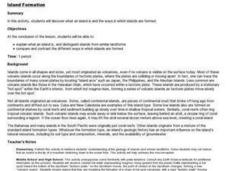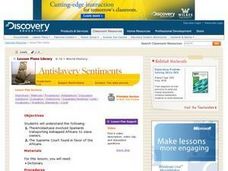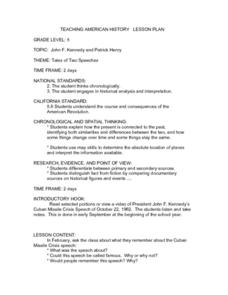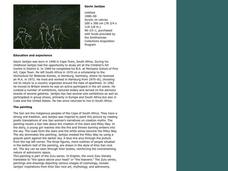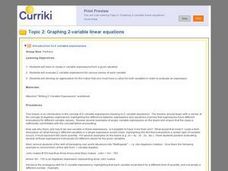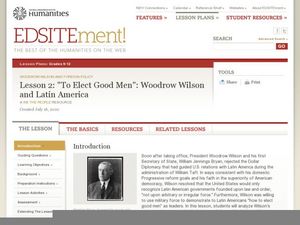Curated OER
Introduction to Selected Documents from the Roxcy Bolton Collection
Students listen to a guided imagery exercise that takes them back to 1969. They brianstorm ideas to try to discover why they would not be allowed to sit at an empty table at a Burdines lunch counter in 1969.
They read letters about the...
Curated OER
Island formation
Students explain what an island is, and distinguish islands from similar landforms. They compare and contrast the different ways in which islands are formed.
Curated OER
Compare the United States Government with Other Political Systems
Young scholars explore the U.S. form of government and illustrate other forms of government found throughout the world. They explain the similarities and differences between the U.S and other governments.
Curated OER
The Early Tensions of the Cold War
Students uncover the roots of the Cold War. In this Cold War lesson, students research the political philosophies of the Soviet Union and the United States during the era as they define key vocabulary and discuss government systems....
Curated OER
Cha Cha
Pupils demonstrate the Cha Cha basics. They practice the Cha Cha basics and keep the beat with the motions. They study a brief history of the Cha Cha and observe music in relation to history and culture.
Curated OER
Taking it to the Streets
Students explain the concept of cultural diffusion. They give examples of cultural diffusion throughout history; e.g. the development of Cuban music and dance. Students explain how cultural diffusion impacts civilizations, past and...
Curated OER
Comic Strip
Pupils work in groups in order to perform research about the different aspects of immigration. Once they have completed the research a comic strip is created regarding the findings.
Curated OER
What about Continental Drift?
Fifth graders research the Continental Drift by researching for evidence of continental movement. The teaching explains the theory of plate tectonics and the Earth's magnetic field. They conclude the lesson by watching the video of "In...
Curated OER
Antislavery Sentiments
Students review the basic facts of the Amistad slave ship case. They are challenged to test their powers of close reading by being asked to summarize the decision handed down by the Supreeme Court of the United States in 1841. Students...
Curated OER
Tale of Two Speeches
Learners view and read portions of John F. Kennedy's Cuban Missile Crisis speech from October 22, 1962. Later in the year, students recall what they remember about the speech and use a Venn Diagram to compare it to Patrick Henry's...
Curated OER
Cabeza de Vaca
Fourth graders observe the 1529 map of the Gulf of Mexico and describe the accuracy of the map, including the unknown landscape that Cabeza de Vaca would traverse. They read the discuss the excerpt of his journey including his treatment...
Curated OER
How Many Days To America?
Fourth graders determine how many different types of immigrant groups came to America. They discuss how immigrants feel when moving to a new place. They read the story, "How Many Days to America" by Eve Bunting and discuss how some...
Curated OER
Science: Finlay and Yellow Fever
Ninth graders research the work of Carlos J. Finlay and his contributions to science. Once they have discussed his theories about diseases, they create tables comparing diseases that use insects as carriers. The lesson also includes a...
Curated OER
Let Your Motto Be Resistance: African American Portraits
Young scholars compare and contrast historical and contemporary photographs of important figures in African American history. In this photography analysis lesson, students learn key photography vocabulary and use a Venn Diagram to...
Curated OER
The Birth of the American Empire as Seen Through Political Cartoons (1896-1905)
High schoolers explore the concept of political cartoons. In this political cartoons lesson, students examine political cartoons from different time periods in American history and respond to questions regarding them.
Curated OER
Topic 2: Graphing 2-Variable Linear Equations
Young scholars explore the concept of 2-variable equations and expressions. In this 2-variable equation and expression lesson, students translate 2-variable word problems into 2-variable equations and expressions.
Curated OER
Justice in America
Eleventh graders analyze primary sources for evidence of intent and purpose. In this American government lesson, 11th graders compose a one-page response explaining their understanding of "justice." Students read and examine quotes about...
Curated OER
The Need for Government—A Cinematic and Literary Perspective
Young scholars examine the philosophy of government. In this types of government instructional activity, students explore literature and movie clips to determine the value of rules in lawless societies.
Curated OER
The Need for Laws
Students consider the presence of authority in their lives. In this law lesson plan, students compare forgotten laws that function in their lives to forgotten instructions in making a peanut butter and jelly sandwich.
Curated OER
Deciphering the Declaration of Independence
Students explore the textual meaning of the Declaration of Independence. In this Declaration of Independence lesson, students read and paraphrase the text of the document into modern-day language. Students also consider the meaning of...
Curated OER
Cold War Wars
In this Cold War worksheet, young scholars respond to short answer questions regarding the Cuban Missile Crisis, the Vietnam War, the Korean War, and the Chinese Civil War. There are 5 short answer questions regarding each of the conflicts.
Curated OER
Cold War Wars
In this Cold War worksheet, high schoolers respond to 21 short answer questions regarding the Cuban Missile Crisis, the Vietnam War, the Korean War, and the Chinese Civil War.
Curated OER
Lesson 2: "To Elect Good Men": Woodrow Wilson and Latin America
Students analyze Woodrow Wilson's foreign policy. In this foreign policy lesson, students examine how the Wilson administration responded to civil unrest in Latin America.
Curated OER
Imperialism and Expansion: Part 1
Students explore the era of imperialism and expansion of the United States. In this American history lesson, students play a game regarding the U.S. attempts to expand the nation in the late 1800s and early 1900s.
Other popular searches
- Cuban Missile Crisis
- Cuba Geography
- Cuban Revolution
- Cuba Revolution
- Cuba 15
- Endangered Animals in Cuba
- Cuba Lesson Plans
- Cuba and u.s. Government
- Cuba Culture
- Communism Cuba
- Kennedy Cuba
- Cuba Culture Communication



